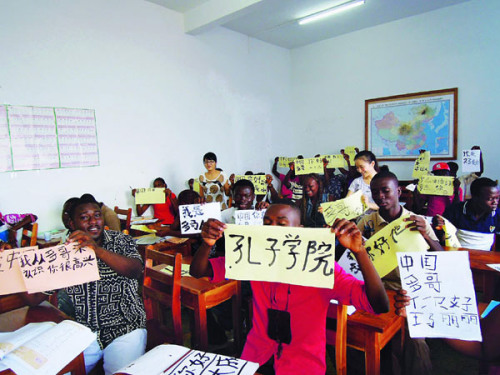
A Chinese calligraphy class in Togo Confucius Institute at University of Lome has attracted great interest in learning Chinese. (Photo/China Daily)
If you didn't already know Xu Lin was an important official in China's Education Ministry, you wouldn't guess it from her manner.
Easygoing and casual over a cup of tea at her office, she chats comfortably in English, her second language, about her mission for her mother tongue: to spread the learning of Mandarin across the globe.
It's been a banner year for Xu, the director- general of Hanban (The Office of Chinese Language Council International), the parent agency of the Confucius Institutes.
The institutes, which are in 108 countries across the globe, operate in conjunction with various foreign universities to teach Chinese language and culture.
Affiliated universities worldwide sent delegations recently to Beijing for an annual conference. University presidents, chancellors and provosts came to the Chinese capital to hear how Hanban has grown, see what it can offer, and report on their progress and the challenges they have faced teaching Chinese in their own classrooms.
While Xu, 56, is enthusiastic about Hanban's growth, she has found her role as gatekeeper changing. In the first few years, she said, the door was wide open as Hanban eagerly pushed to expand, especially in target areas such as the United States, Canada and Europe, where educational ties were well-established and language programs were strong on both sides.
"Today we have almost 400 Confucius Institutes abroad - and we could have 500 tomorrow, if we had qualified teachers to send," she said. "Many excellent university programs have given us strong applications."
But the next round of countries will be harder to support, she said, because Hanban is still building programs with many less commonly spoken languages, such as Swahili and Farsi, and even widely spoken tongues of the Indian subcontinent that are not common in China.
"So now, instead of holding the door open wide, we are only holding the door like this," she says, bringing her outstretched hands closer together, "until we have more capability".
That's not news in academic centers such as Beijing Foreign Studies University. BFSU's president, Chen Yulu, recently told China Daily that the current number of languages taught there cannot meet future needs. "We plan to cover 89 less-commonly taught languages by 2020," he said.

Copyright ©1999-2011 Chinanews.com. All rights reserved.
Reproduction in whole or in part without permission is prohibited.